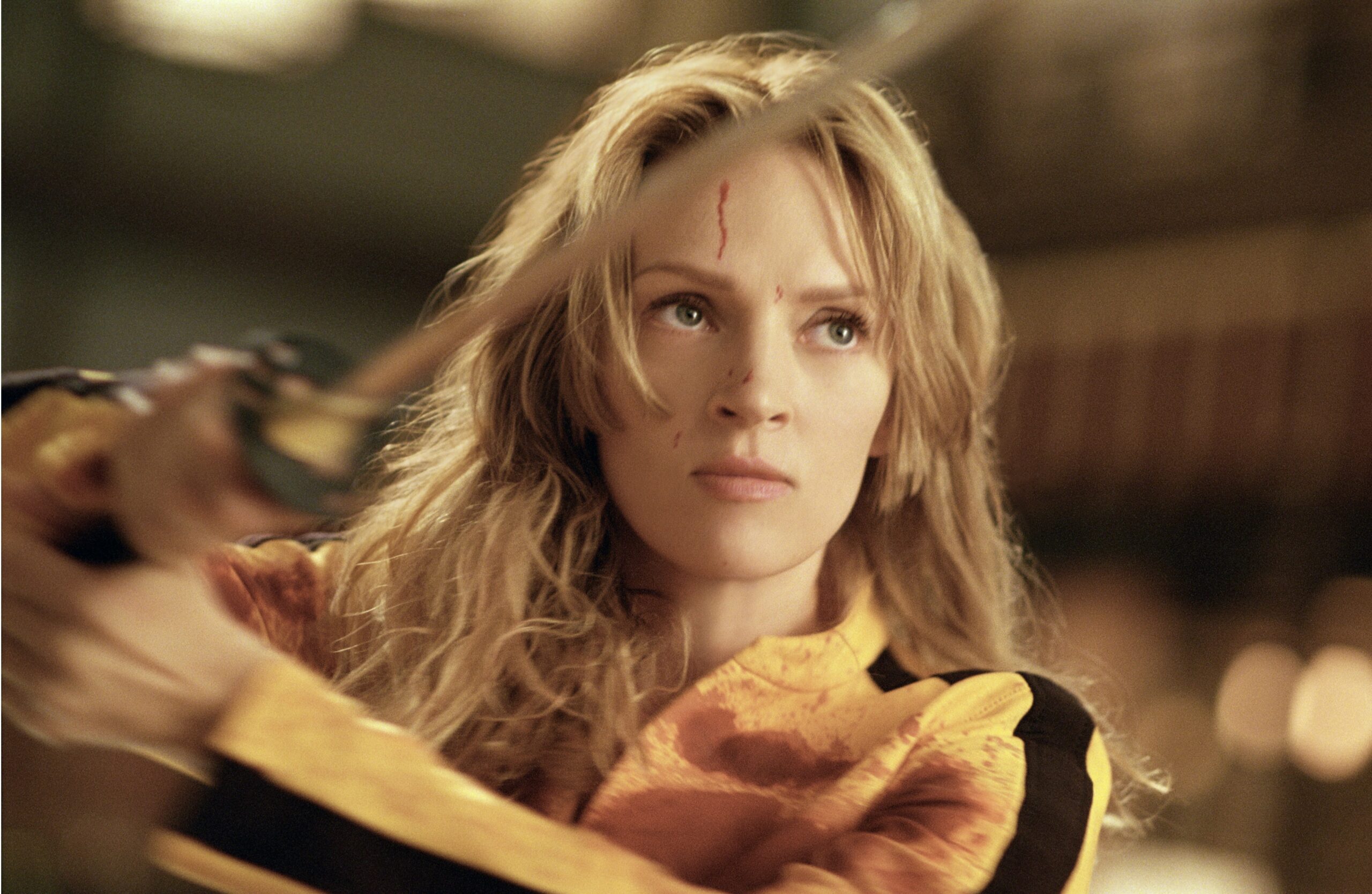Uma Thurman, an attractive blond with a lanky frame, found acting success in school plays. Talent scouts discovered her, and she soon landed a few formulaic Hollywood movies.
Thurman shot to prominence in 1994’s Pulp Fiction, a film that made her an instant star. The next year, she starred in the John Woo cautionary Paycheck.
Pulp Fiction (1994)
Uma Thurman and Ethan Hawke’s off-screen romance fueled drama around the much-heralded Pulp Fiction (1994), the writer/director Quentin Tarantino’s love letter to gangster movies and Sergio Leone films. The movie’s ever-fascinating time-jumping episodes and crazy cast (Samuel L. Jackson as a philosophizing hit man and Bruce Willis as an aging boxer) ensured the film never had a dull moment.
The film was a critical and commercial success, and Thurman’s severe black wig and delirious twist with Travolta in the diner went down as one of pop culture’s most memorable images. Thurman went on to star in the follow-ups Kill Bill: Vol. 1 (2003) and Kill Bill: Vol. 2 (2004), which also received strong reviews and a wide audience. [2]
Gattaca (1997)
Uma Thurman emerged from Pulp Fiction with renewed attention, reteaming with director Quentin Tarantino for the bloody two-part magnum opus Kill Bill: Vol. 1 (2003). She also appeared in the John Woo cautionary Paycheck (2003).
Gattaca explores a frightening future world obsessed with genetic perfection to the point of separating people into those born by Petri dish (“Valids”) and those who are naturally born (“Invalids”). Ethan Hawke stars as Vincent Freeman, a low-rank janitor with a heart condition whose determination to travel into space leads him to assume the identity of a Valid.
Stylishly scoped and smartly visualized with forbiddingly cold design, Gattaca evokes Big Think sci-fi like George Lucas’ THX 1138 and Jean-Luc Godard’s Alphaville. But the icy veneer eventually thaws and a few flaws creep in.
Batman & Robin (1997)
After making her on-screen debut in Kiss Daddy Goodnight, Thurman gained more attention with roles in neo-noir films like Dangerous Liaisons and Henry & June. She continued to act in a mix of romantic comedies, dramas and science fiction films.
Thurman lent her glamour to the reviled Joel Schumacher sequel Batman & Robin as Poison Ivy, a plant-loving femme fatale with plans to terraform Gotham City. She also starred in the 1998 film adaptation of Victor Hugo’s Les Miserables as Fantine, a working-class single mother forced to resort to prostitution to support her child.
In Andrew Niccol’s Gattaca, Thurman played Irene Cassidi, an investigator on the trail of Vincent Freeman, a genetically inferior man who assumes the identity of a superior one to pursue his dream of space travel. The movie was nominated for an Oscar, BAFTA and Golden Globe award.
Kill Bill: Vol. 1 (2003)
One of Uma Thurman’s most memorable performances came from her reteaming with director Quentin Tarantino for Kill Bill Volume 1. She plays The Bride, a former assassin who swears revenge on the group of men that killed her unborn child and jilted her fireman husband-to-be.
She’s brilliant as the psychopathic killer who goes after her list of enemies in this thrilling, action-packed martial arts epic.
The Oscar-winning actress starred in several other notable films, including Dangerous Liaisons, Henry & June and Kiss Daddy Goodnight before she was cast as Mia Wallace in Pulp Fiction. She went on to receive accolades for her work in movies like Gattaca, Batman & Robin and more.
Kill Bill: Vol. 2 (2004)
With Quentin Tarantino’s bloody two-part magnum opus tribute to exploitation films and Sergio Leone, Thurman reprised her role as The Bride, a nameless assassin beaten and left for dead who awakens in a coma to wreak violent vengeance on her betrayer (David Carradine). A sexy, cynical, intelligent sleuth, the film proved to be Thurman’s career revitalizing breakthrough.
The Houston Chronicle likened her to Mae West, while The A.V. Club noted that she “combines true femininity with the winking womanliness of a drag queen.” Following her stint on the big screen, Thurman returned to TV for the five-episode miniseries Hysterical Blindness (2002). She has since appeared in a number of other movies, including the comedy-drama Burnt and the period drama Vatel. Thurman also serves on the board of Room to Grow, a foundation dedicated to enriching children’s critical first years of life.
Burnt (2007)
While the lanky beauty was already a sought-after model, her acting chops won her greater recognition with the neo-noir Dangerous Liaisons and the thriller Henry & June. Afterwards she appeared in a number of prestigious films, including the Quentin Tarantino revenge flick Kill Bill Vol. 1 and the John Woo cautioner Paycheck.
The much-anticipated Burnt was once considered a prestige project and many predicted that Thurman would be nominated for an Oscar in the lead role. However, the movie ultimately fails to deliver on its promise of juggling comedy, drama and romance. The biggest problem is that the characters are flat and one-dimensional. Bradley Cooper and Sienna Miller give solid performances but even they are not enough to keep this movie afloat. It is also predictable and a bit too safe.
Vatel (2000)
The Cannes 2000 festival opened with Vatel, a film in which Gerard Depardieu plays Francois Vatel, the 17th-century “master of festivities and pleasures” who killed himself after he was forced to serve up a three-day banquet-cum-spectacle for Louis XIV. Roland Joffe coaxes uneasy performances from the entire cast, but it’s Depardieu who suffers the most — he looks like he’s on auto-pilot as he copes with one horrendous crisis after another.
Joffe’s movie succeeds because it depicts a facet of court life that is often overlooked. Vatel’s cooks, purveyors, and servants are just as important as their employer; they’re the ones who ultimately feed and entertain the nameless army that supports the king’s indulgent excesses. That’s a message that has as much resonance today as it did in the 1600s.

